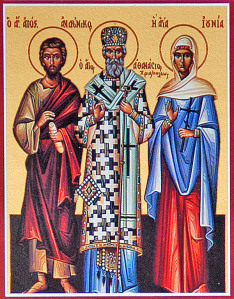On letting Junia fly
One of the posts in this month's Synchroblog is Letting Junia Fly: Releasing the Called | Wendy McCaig. It set me thinking, and here are some of the thoughts it provoked.
It is rather difficult to write, because in many ways it may look like arguing against what Wendy said in her post, marshalling counter-arguments, and trying to refute what she said. But if there is any sermonising here, it is directed at me rather than Wendy.
Who was Junia?
According to the web site of the Orthodox Church in America
Saint Junia and Saint Andronicus of the Seventy were relatives of the holy Apostle Paul. They labored much, preaching the Gospel to pagans. St Paul mentions them in his Epistle to the Romans: "Salute Andronicus and Junia, my kinsmen and fellow prisoners, who are of note among the Apostles, who also were in Christ, before me" (Romans 16:7).
St Andronicus was made Bishop of Pannonia, but his preaching also took him and St Junia to other lands, far from the boundaries of his diocese. Through the efforts of Sts Andronicus and Junia the Church of Christ was strengthened, pagans were converted to the knowledge of God, many pagan temples closed, and in their place Christian churches were built. The service in honor of these saints states that they suffered martyrdom for Christ.
St Junia was an apostle. Wendy, in her blog post, says, "Junia can fly – will you show her how?"
And Wendy goes on to say
I am a grown woman. I am a former CPA who founded a rapidly growing non-profit that has managed to keep the doors open for seven year in the midst of a recession – no small accomplishment. I have demonstrated that I can hold my own in the corporate and non-profit arena. So why am I running from the institutional church?
The truth is I am afraid – afraid of being caged. When I think of the institutional church, the memories come flooding back. I have the memory of serving on a mission's team and being told that the most important role I could play was to bake cookies for the outreach efforts even though I don't cook and have a Masters of Divinity. It is the memory of being told that I could lead as long as no one saw me as a leader because I was a woman and that would be unbiblical. It is the memory of asking my church for $100 to help a family avoid eviction and being told there was no money because of the multi-million dollar building campaign. This basically said to me, "Your call to care for the poor is not a valid call of the church."
None of these comments were malicious. None of the individuals meant to cage me. One by one these limitations, messages and painful situations convinced me that I could not be me in the institutional models of the church. So I left and choose to exercise my call within the non-profit sector. I know I am not alone in this. Most people don't start non-profits but many leave the church to follow their call.
Now in some ways I have a lot of sympathy with that. I have had similar experiences.
In another post, In the Company of Junia, Wendy notes some Western Protestant attempts to change Junia's sex and deny that there were female apostles. But Junia herself was never caged. Even in martyrdom, she flew. And she doesn't need us to help her.
Yes, I have often felt "caged" by the instiutional church. I have often felt that my gifts and talents were not being recognised, and not used, and that others were being paid to do things that I had to do as a hobby and finance from my own resources. It would be nice to be released from the cage and allowed to fly.
And the impression I get from this is that if Junia could fly, she would find fulfilment in her ministry, she would release her potential and be everything that she could be. And wouldn't it be cool if she, and all the rest of us, could do that.
But a nagging thought comes to me.
It was Jesus saying, "For the Son of man also came not to be served, but to serve, and to give his life as a ransom for many" (Mark 10:42).

St Andronicus and St Junia flanking St Athanasius the New of Christianopolis, all commorated on May 17
Ministry means service; but it is not about being served, but serving. It is not about me. It is not about me flying, me finding personal fulfilment, me realising my potential.
St Paul asks, "Are all apostles? are all prophets? are all teachers? are all workers of miracles? Have all the gifts of healing? do all speak with tongues? do all interpret?" (I Cor 12:29-30) clearly expecting the answer no. St Junia was an apostle, but that doesn't necessarily follow that I am or should be. There are many different ministries in the church, but all of them are for serving God and his people, and not our own self-fulfilment.
Now I am not saying that Wendy said this, or intended to say this, but there are many who speak as if ministries in the Church are like secular jobs, dependent on qualifications, abilities and merits measurable by human standards. But in Christian ministry, the moment I think I am the right person for a particular ministry, it probably means that I am not.
It doesn't always work like this, of course. The Church is no stranger to ambition, status seeking, and power-hungry climbers if the hierarchical ladder. But I'm saying that it shouldn't be like that, and we should not be thinking of ministry in those terms.
And I don't think St Junia did.











